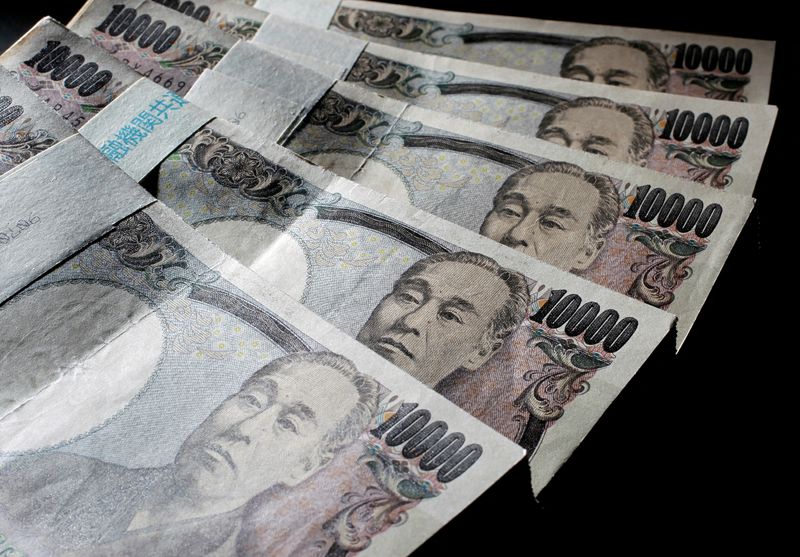
- All Instrument Types
- Indices
- Equities
- ETFs
- Funds
- Commodities
- Currencies
- Crypto
- Bonds
- Certificates
Please try another search

Yen at risk of declining vs dollar into Q4 or later, economists say: Reuters poll
 © Reuters. FILE PHOTO: Illustrative picture shows Japanese 10,000 yen bank notes spread out at an office of World Currency Shop in Tokyo in this August 9, 2010 illustrative picture. REUTERS/Yuriko Nakao/File Photo/File Photo/File Photo
2/2
© Reuters. FILE PHOTO: Illustrative picture shows Japanese 10,000 yen bank notes spread out at an office of World Currency Shop in Tokyo in this August 9, 2010 illustrative picture. REUTERS/Yuriko Nakao/File Photo/File Photo/File Photo
2/2
By Kantaro Komiya
TOKYO (Reuters) - The yen is at risk of weakening further against the dollar for at least the rest of 2022, more than two-thirds of economists polled by Reuters said, underscoring the consequences of the Bank of Japan being the lone major central bank clinging to easy policy.
The BOJ is sticking to stimulus, ramping up bond buying to defend its yield cap even as the U.S. Federal Reserve, already on an aggressive campaign of half-point rate rises, looks set to debate an even bigger move of 75 basis points on Wednesday.
The resulting yen weakness is increasingly becoming a source of contention for policymakers. It hurts household budgets by driving up living costs that are already rising due to global inflation, offsetting the boost a cheaper currency gives exporters.
The Japanese currency has lost more than 14% against the greenback so far this year, briefly slipping as low as 135.58 yen per dollar on Wednesday, its lowest since October 1998, which was a time of global financial strain after a Russian debt default.
Wednesday's level was already close to the weakest forecast for the next 12 months provided by any of 47 foreign exchange strategists polled by Reuters just two weeks ago - 135.67 per dollar.
The yen's slide has been so severe that it led the government and the central bank to issue a rare joint statement on Friday expressing concern.
"The yen is likely to remain vulnerable to weakening as the Fed's rate hikes and the rise in long-term Treasury yields continue throughout the year," said Takumi Tsunoda, senior economist at Shinkin Central Bank Research Institute.
Risk of further yen declines will remain until the final quarter of the year, said nine of 25 economists polled. Another four said risk would remain until the first half of next year, and five said it would last until the second half of next year or later.
Just seven projected the risk would run its course by the end of next quarter, while none said the yen was no longer at risk of further weakening.
In a multiple-selection question asking for the most effective action from the government to stem further weakening in the yen, 12 out of 25 economists chose "reopen borders for more inbound tourists".
That was followed by "press the BOJ to tweak monetary policies", chosen by another eight respondents.
Letting in more foreign travellers would likely increase demand for the yen. Japan began accepting chaperoned tour groups this month, relaxing its previous COVID-19 border controls, which included a ban on almost all non-residents.
Other options included "restart more nuclear power plants" (chosen by eight respondents), "continue verbal warnings" (six) and "no need to do anything in particular" (four).
The BOJ was projected to keep its ultra-loose monetary policy at its next two-day rate review, concluding on Friday, the June 3-13 poll showed. Nearly 80% of 28 economists said the bank would not adjust policies until late 2023 or later, and all but two expected any such a shift would be unwinding of the easing.
Japan's economy was forecast to expand an annualised 4.1% in the current quarter, slower than the 4.5% projected in May's poll, according to the median forecast of 37 analysts.
The world's third-largest economy was expected to grow 2.2% in the fiscal year beginning April 2022 and 1.6% in fiscal 2023.
Core consumer prices, which exclude volatile fresh food prices, will likely increase 2.1% this fiscal year, before decelerating to 1.1% in fiscal 2023, the poll showed.
(For other stories from the Reuters global economic poll:)
Related Articles
Are you sure you want to block %USER_NAME%?
By doing so, you and %USER_NAME% will not be able to see any of each other's Investing.com's posts.
%USER_NAME% was successfully added to your Block List
Since you’ve just unblocked this person, you must wait 48 hours before renewing the block.
I feel that this comment is:
Thank You!
Your report has been sent to our moderators for review






Add a Comment
We encourage you to use comments to engage with other users, share your perspective and ask questions of authors and each other. However, in order to maintain the high level of discourse we’ve all come to value and expect, please keep the following criteria in mind:
Enrich the conversation, don’t trash it.
Stay focused and on track. Only post material that’s relevant to the topic being discussed.
Be respectful. Even negative opinions can be framed positively and diplomatically. Avoid profanity, slander or personal attacks directed at an author or another user. Racism, sexism and other forms of discrimination will not be tolerated.
Perpetrators of spam or abuse will be deleted from the site and prohibited from future registration at Investing.com’s discretion.